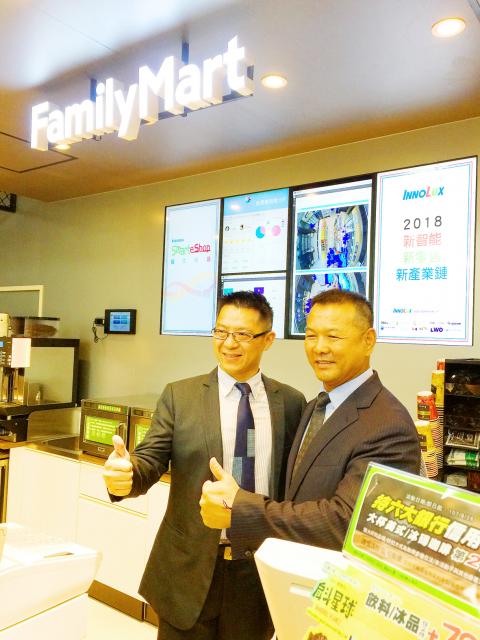Innolux Corp (群創), a flat-panel manufacturing arm of Hon Hai Precision Industry Co (鴻海精密), yesterday said it is expanding its business scope by supplying higher-margin displays to retailers and convenience store chains to build up its brick-and-mortar smart store system.
Innolux made the remarks after announcing its partnership with Taiwan FamilyMart Co (全家便利商店), the nation’s second-largest convenience store chain, supplying displays and advanced technologies to build smart stores similar to Amazon’s first brick-and-mortar store “Amazon Go,” allowing shoppers easier access to promotion information and to do self-checkouts for online purchases.
In its first smart store venture with FamilyMart at its plant in Tainan, Innolux helped install more than 100 displays — mostly in the form of digital signage ranging from 23-inch to 58-inch displays.

Photo: Lisa Wang, Taipei Times
The panelmaker also helped build an Internet of Things (IoT) network by integrating facial recognition technology, cameras and sensors to collect data for analysis of consumer behavior.
FamilyMart also benefits in the form of a smaller headcount and automatic security.
“This is another step forward for Innolux,” chairman Jim Hung (洪進揚) told reporters on the sidelines of a news conference in Tainan.
“The company mainly sells panels to makers of TVs, mobile phones, or tablets. It is a B2B [business-to-business] model. Now, we are expanding our reach to B2C [business-to-consumer],” he said.
Hung assumed his position two months ago to assist Innolux in restructuring its product and technology portfolio by leveraging the strength of its parent, Hon Hai.
Smart store total solutions offer higher gross margins, Hung said.
“This is an area that enjoys faster growth rates than established product lines. The growth [for smart store solutions] is in the double digits, compared with a single-digit for current products,” Hung said.
Innolux plans to build 20 more smart stores for FamilyMart in Tainan later this year.
It is also entering final negotiations with two or three wine retailers, cosmetic stores, pharmacies and hypermarkets to build smart stores in Taiwan and China, he said.
Digital signage currently contributes minimal revenue to Innolux, but Hung said he expects strong growth next year with more projects in the pipeline.
To offer total smart store solutions, Innolux early this year expanded its public information display team to include displays for the “new retail” segment.
The company plans to expand its smart store business staff from 10 now to 30 by the end of this year, Innolux vice president James Yang (楊柱祥) said.

With an approval rating of just two percent, Peruvian President Dina Boluarte might be the world’s most unpopular leader, according to pollsters. Protests greeted her rise to power 29 months ago, and have marked her entire term — joined by assorted scandals, investigations, controversies and a surge in gang violence. The 63-year-old is the target of a dozen probes, including for her alleged failure to declare gifts of luxury jewels and watches, a scandal inevitably dubbed “Rolexgate.” She is also under the microscope for a two-week undeclared absence for nose surgery — which she insists was medical, not cosmetic — and is

CAUTIOUS RECOVERY: While the manufacturing sector returned to growth amid the US-China trade truce, firms remain wary as uncertainty clouds the outlook, the CIER said The local manufacturing sector returned to expansion last month, as the official purchasing managers’ index (PMI) rose 2.1 points to 51.0, driven by a temporary easing in US-China trade tensions, the Chung-Hua Institution for Economic Research (CIER, 中華經濟研究院) said yesterday. The PMI gauges the health of the manufacturing industry, with readings above 50 indicating expansion and those below 50 signaling contraction. “Firms are not as pessimistic as they were in April, but they remain far from optimistic,” CIER president Lien Hsien-ming (連賢明) said at a news conference. The full impact of US tariff decisions is unlikely to become clear until later this month

GROWING CONCERN: Some senior Trump administration officials opposed the UAE expansion over fears that another TSMC project could jeopardize its US investment Taiwan Semiconductor Manufacturing Co (TSMC, 台積電) is evaluating building an advanced production facility in the United Arab Emirates (UAE) and has discussed the possibility with officials in US President Donald Trump’s administration, people familiar with the matter said, in a potentially major bet on the Middle East that would only come to fruition with Washington’s approval. The company has had multiple meetings in the past few months with US Special Envoy to the Middle East Steve Witkoff and officials from MGX, an influential investment vehicle overseen by the UAE president’s brother, the people said. The conversations are a continuation of talks that

CHIP DUTIES: TSMC said it voiced its concerns to Washington about tariffs, telling the US commerce department that it wants ‘fair treatment’ to protect its competitiveness Taiwan Semiconductor Manufacturing Co (TSMC, 台積電) yesterday reiterated robust business prospects for this year as strong artificial intelligence (AI) chip demand from Nvidia Corp and other customers would absorb the impacts of US tariffs. “The impact of tariffs would be indirect, as the custom tax is the importers’ responsibility, not the exporters,” TSMC chairman and chief executive officer C.C. Wei (魏哲家) said at the chipmaker’s annual shareholders’ meeting in Hsinchu City. TSMC’s business could be affected if people become reluctant to buy electronics due to inflated prices, Wei said. In addition, the chipmaker has voiced its concern to the US Department of Commerce